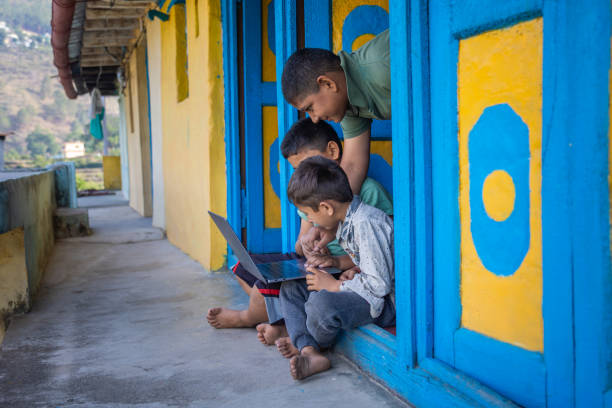
Many experts will say yes; teachers can aid learning and provide the student’s guidance and context. They motivate and inspire. What happens when there aren’t any teachers in the classroom? Do computers have the capacity to perform the task?
Katrin Macmillan believes so. She’s the co-founder of Projects for All, a non-profit dedicated to increasing the capabilities of learning with computers. It’s primarily helping install computers, also known as Hello Hubs, in remote or harsh locations where teachers aren’t able or wish to travel, like isolated villages, refugee camps, or rural areas. It’s then the responsibility of the children.
“When we give them the tools to learn,” said Macmillan in an interview with Forbes, “children take their education to greater heights than we could ever have imagined.”
Macmillan’s optimism is based upon the positive response to the first Hello Hub, established in October of last year in a remote village in Nigeria known as Suleja. Macmillan says up to 500 kids each week use computers to play educational games or connect to the rest of the world. Though most kids could not use the computer before, they soon figured it out. And so did the village’s adults, though perhaps not as swiftly. Nevertheless, the Hello Hub is owned by all the community residents and can be utilized by all.
A Hello Hub is a kiosk powered by solar energy equipped with a computer packed with educational games and software with integrated video and still cameras. The sturdy structure, constructed chiefly of recycled bottles, has two benches that accommodate four people, a charging station, and a Wi-Fi connection that people can use on their phones. Hello Hub is meant to be a community experience. However, every participant in the community has a login, which loads an individual desktop with files saved.
Because running requires sunlight, The Hello Hub is intended to be outdoors, exposed to the weather. It comes with specially designed keyboards and screens that stand up to the elements of rain, wind, dust, and countless tapping fingers. It still requires dedicated maintenance. This is why the community’s involvement is crucial. If a community lets a kiosk be built, the residents make it (all programs are free). Learn how it functions and manage it. (Projects for all tech experts are on Skype.) The community oversees its usage, all the way to setting the parental controls.
Macmillan has claimed she’s heard many instances that her equipment would be stolen or vandalized and that people could use it to watch porn. However, so far, nothing has occurred. It’s no doubt to know that this Hub is situated in a public space, meaning that any infraction is the responsibility of all. In addition, the entire idea is built on trust. Ideally, every member of your community will feel like they are a part of ensuring the computers are running smoothly and children-friendly. It’s something all residents can share, similar to the well.
Learning tools
Macmillan’s belief in the power to teach without a teacher is fueled by the work of Sugata Mitra, a scientist and educator who’s now an advocate for what Macmillan calls Minimally Invasive Education.
Mitra is well-known for”his” “Hole-in-the-Wall” experiments, initially in a New Delhi slum, then later in an isolated town and an Indian village in India. He set up computers in the area where children could access them. He observed that, in each of the locations, children were able not only to learn to use computers but also to learn concepts such as DNA replication.
“Many of Sugata Mitra’s success stories start with a simple question for the students, which they have to figure out using the computer and the Internet,” is the message on the website of Projects For All. “The consequential learning that takes place on the way to the answer is often more significant than the answer itself.”
The results from Mitra’s experiment and the lessons Macmillan had learned from living in the slums of Africa about how education is revered in the country made her believe she was right that Hello Hubs could work.
“They will do anything for an education because they know it’s their chance for a better life,” she explained to a Forbes interviewer. “Their technological and educational capabilities far outstrip our expectations of them.”
It’s not just limited to children. The Internet can provide adults in the community with the ability to access an array of ideas and solutions for issues ranging from economic to medical to social that would otherwise be unattainable in the remote reaches of Nigeria.
The idea is to replicate the program in a small number of other Nigerian villages this spring before helping to establish Hello Hubs in communities in the Democratic Republic of the Congo, Kenya, Ethiopia, India, and maybe Tanzania, Rwanda, Ghana, Peru, the Dominican Republic, and Haiti. She believes the concept is a great way to bring education to areas that can’t afford it, such as the massive refugee camps all over the globe.
What kind of influence Projects for All can achieve will be determined by how much money it can collect through contributions. Macmillan concedes that “child-led digital education” can be challenging to sell, though it did get an endorsement by actor Hugh Jackson last week.
However, Macmillan is thinking big. For instance, she estimates the number of kids who do not attend school in sub-Saharan Africa.
“That,” she said, “needs to be fixed.”
